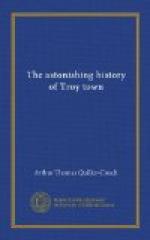Caleb moved uneasily, but was silent.
“But my life has been too lonely for me,” pursued his master wearily. “On general grounds one would not imagine the life of a successful hermit to demand any rare qualifications. It is humiliating, but even as a hermit I am a failure: for instance, you see, I want to talk.”
His hearer, though puzzled by the words, vaguely understood the smile of self-contempt with which they were closed.
“As a woman-hater, too, my performances are beneath contempt. I did think,” said Mr. Fogo with something of testiness in his voice, “I should prove an adequate woman-hater, whereas it happens—”
He broke off suddenly, and took a turn or two up and down the room. Caleb could have finished the sentence for him, but refrained.
“Surely,” said Mr. Fogo, pausing suddenly in his walk, “surely the conditions were favourable enough. Listen. It is not so very long ago since I possessed ambitions—hopes; hopes that I hugged to myself as only a silent man may. With them I meant to move the world, so far as a writer can move the world (which I daresay may be quite an inch). These hopes I put in the keeping of the woman I loved. Can you foresee the rest?”
Caleb fumbled in his pocket for his pipe, found it, held it up between finger and thumb, and, looking along the stem, nodded.
“We were engaged to be married. Two days before the day fixed for our wedding she—she came to me (knowing me, I suppose, to be a mild man) and told me she was married—had been married for a week or more, to a man I had never seen—a Mr. Goodwyn-Sandys. Hallo! is it broken?”
For the pipe had dropped from Caleb’s fingers and lay in pieces upon the floor.
“Quite so,” he went on in answer to the white face confronting him, “I know it. She is at this moment living in Troy with her husband. I had understood they were in America; but the finger of fate is in every pie.”
Caleb drew out a large handkerchief, and, mopping his brow, gasped—
“Well, of all—” And then broke off to add feebly, “Here’s a coincidence!—as Bill said when he was hanged ’pon his birthday.”
“I have not met her yet, and until now have avoided the chance. But now I am curious to see her—”
“Don’t ’ee, sir.”
“And to-night intended writing.”
“Don’t ’ee, sir; don’t ’ee.”
“To ask for an interview, Caleb,” pursued Mr. Fogo, drawing himself up suddenly, while his eyes fairly gleamed behind his spectacles. “Here I am, my past wrecked and all its cargo of ambitions scattered on the sands, and yet—and yet I feel tonight that I could thank that woman. Do you understand?”
“I reckon I do,” said Caleb, rising heavily and making for the door.
He stopped with his hand on the door, and turning, observed his master for a minute or so without remark. At last he said abruptly—




